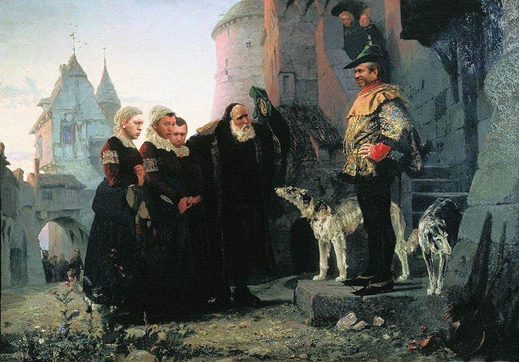
By John Helmer, Moscow
An unusual moment occurred on Wednesday this week in Roman Abramovich’s testimony in the UK High Court when he refers to the seigneurial right – that historically doubtful power a feudal lord claimed for first sex with young virgins on his estates, who were, by feudal law, his property.
Abramovich says: “Well, it’s the thing which is called the right of the first night”. In the Russian and the English, Abramovich is referring to the Latin jus primae noctis – properly translated, that’s the law of the first night. The feudal law textbooks claim the rape could be bought off if the girl gave the lord part or all of her dowry. Either way, she would become used property and unmarriageable.

For sex suddenly appear to appear in court during hours of questioning about how it happened that Abramovich came to sell his shareholding in Rusal, the Russian aluminium concern, to Oleg Deripaska (left image) for $2.03 billion was unusual. That’s because Abramovich (right image) made his response in answer to questioning about a right of an altogether different kind.
He was being asked by Laurence Rabinowitz, advocate for Boris Berezovsky, if Abramovich understood the right of first refusal in a contract of sale and purchase he had signed on September 17, 2003, with Deripaska. According to the evidence in court, Abramovich was asking $2 billion for his shareholding, but accepted that Deripaska didn’t have the cash to pay all at once.
Abramovich also testified that despite the enormous sums of money he was taking out of Rusal each year, he wanted to sell out because there was serious conflict in the management of the Rusal operations and plants. Abramovich acknowledged that he had trouble remembering how much his cut-out company, Madison, received from Rusal, but agreed with papers presented to him showing he and Madison took $425 million out of Rusal in 2001; $417 million in 2002; and $529 million in 2003. When asked to confirm, Abramovich replied: “Well, I don’t know. I think so, yes.”
In the summer of 2003, however, the cash-cow was ready for disposal, because, Abramovich told the court, “we agreed with Mr Deripaska that we’ll finish our relationship because the relationship between our managing teams were very stressed, we knew it wouldn’t lead to anything good and that would put an end to our joint business.”
Rabinowitz then cross-examined Abramovich on clause 2 in the sale contract. Abramovich is asked if he and Deripaska had agreed to sequence the sale into two tranches, one of 25% and another of 25%; and if the deal contract gave Deripaska the option to match a third-party bid for the second 25%. That, explained the lawyer, “applies if you have received an offer from someone else. At that point, Mr Deripaska can say to you, ‘I want to buy, not that third party. Give me the right to buy’. Do you understand what I am saying?”
At that instant, an unfashionable form of sexual intercourse with unwilling partners flashed into Abramovich’s head. Out popped a remark, which will have the historians of Russia psycho-analyzing for years.
Abramovich then went on to claim the famous “I know what I know” defence against the failure to read. He testified that he knew what he and Deripaska had agreed, but: “I haven’t read this contract so I do not know. I can explain to you what we’ve agreed.”
There is no reference by Abramovich to having sex with Deripaska. Or with anybody. The moment when the most powerful, wealthy and ingratiating businessman in Russia confuses an option and a fuck has passed.
The court testimony reveals there had been a great deal of screwing around. Abramovich was shown a statement Deripaska has signed for the Michael Cherney trial to come in the same court. In that evidence, Deripaska says that in the summer of 2003, he had told Abramovich he wanted to buy the full 50% shareholding in Rusal from Abramovich, and was told that wasn’t possible because “I [Deripaska] was told [by Abramovich] that only 25 percent was available”. Abramovich’s pre-trial deposition was then read out to him in which he said: “I believe Mr Deripaska did not have sufficient cash to pay for the entire purchase in full.”
“Mr Deripaska always tells the truth”, Abramovich went to say from the witness box, adding his denial that the real reason he told Deripaska he couldn’t sell him the second 25% was because Berezovsky and Badri Patarkatsishvili owned it, and had to give their consent to sell.
Abramovich does not explain in his court testimony why he priced the two equal-sized stakes in Rusal at $1.58 billion and $450 million respectively, except to claim that included in the deal Abramovich was also selling Deripaska his share in Irkutskenergo, an electricity generating company supplying power to Irkutsk-region aluminium smelters; and Ruspromavto, a holding of car-manufacturing assets, which Abramovich described as “a hobby for Oleg”. In the documents presented in court, the minor assets went into the first-stage deal, signed on September 17, 2003. The second stage, with the remaining 25% of Rusal, was supposed to be completed one year later, in 2004.
The buy-sell parties to this deal were named in court as Madison Equities Corporation for Abramovich; and Baufinanz Limited for Deripaska. But the documents also reveal that Deripaska had structured shareholding control of Rusal between several companies — Rusal Holding, Dilcor, David Worldwide, Valeford, Kadex, Slivenski, and Galinton.
Rabinowitz asked Abramovich if the purpose of this elaborate structure, and the papers he had signed with Deripaska in September of 2003, was “that the net result of the arrangements that you and Mr Deripaska made was that control of these companies, and through them Rusal, would have passed to Mr Deripaska on 30 September 2003?”
Abramovich replied: “I accept that the control of Rusal would have passed toMr Deripaska.” He and Berezovsky’s advocate went on to disagree over how control differed from ownership.
What hasn’t passed is the risk for Deripaska, who claims he owns the 47.41% Rusal officially says he holds in the company through the EN+ holding.
For Abramovich’s testimony has exposed that at least 25%, and more likely 50% of the shareholding capital of Rusal, formed in 2001, had owners other than Abramovich and Deripaska themselves; these other stakeholders are the partners referred to in taped conversations, memoranda of record, and contracts.
Berezovsky is claiming in the current High Court proceeding that his shareholding in Rusal is owed to him by Abramovich. Whether his parallel claim in the same proceeding that Abramovich also owes him a stake in the oil company Sibneft, now Gazpromneft, will be decided separately by the presiding judge, Justice Dame Elizabeth Gloster. She may make a split decision, rejecting the Sibneft claim, and awarding the Rusal one. At one point in Wednesday’s testimony by Abramovich, she interrupted him to ask directly: “Just a second. The point that’s being put to you is that if, as you said, you had an agreement right from the start with Deripaska that he would buy from you the second tranche of 25 per cent for 450, why wasn’t that put into a binding written agreement at the same time as the agreement for the first stage?”
Abramovich reieterated that Deripaska didn’t have enough cash. He then added for the judge: “He didn’t want to put obligations into this contract because it wasn’t clear that he would find the money.”
Whatever will be decided on Berezovsky’s claims against Abramovich, Deripaska’s legal right to hold the shares he claims is on trial now. The first and largest claimant against him is Mikhail Chernoy (Michael Cherney); he is asking the High Court to confirm and enforce signed agreements with Deripaska from March 2001 – two years before the Abramovich-Deripaska contracts of 2003 — entitling Cherney to at least 13% of Rusal, plus dividends, asset sale proceeds, and costs, the sum of which is about $6 billion. The trial of Cherney v Deripaska commences in the High Court in sixteen weeks’ time.
But in no time at all, on November 18, Deripaska is scheduled to go into the London witness box for questioning by lawyers for Abramovich, who have called him to testify. Those holding Deripaska promissory notes and trust undertakings to portions of his shares in Rusal and other companies, not to mention intelligence and police agents of several nationalities, are also likely to be following the proceedings with great attention to detail.











Leave a Reply